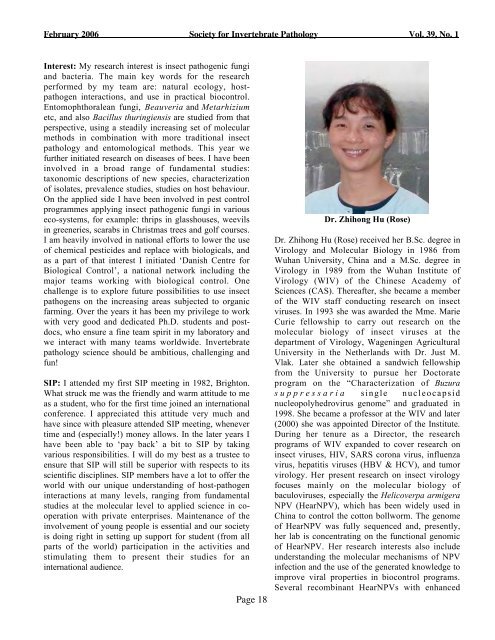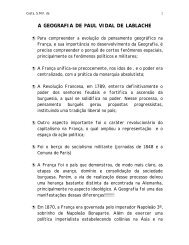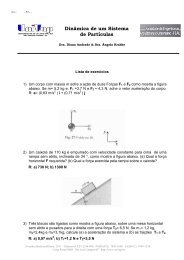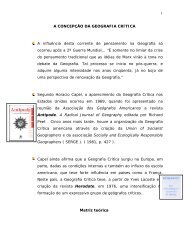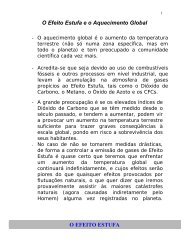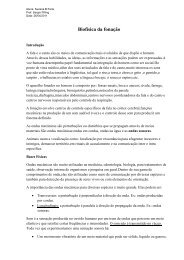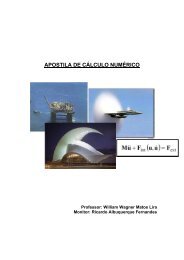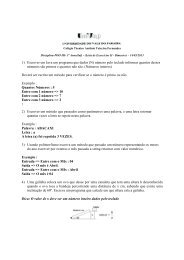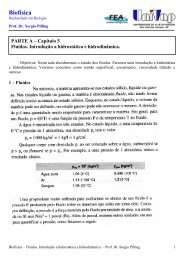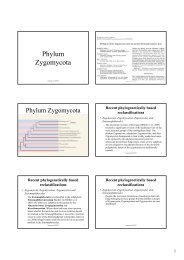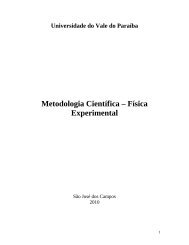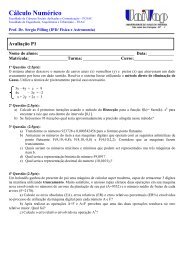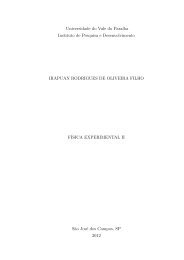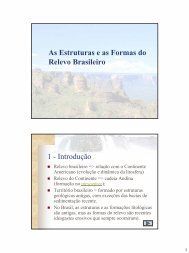The SIP Newsletter - Society for Invertebrate Pathology
The SIP Newsletter - Society for Invertebrate Pathology
The SIP Newsletter - Society for Invertebrate Pathology
Create successful ePaper yourself
Turn your PDF publications into a flip-book with our unique Google optimized e-Paper software.
February 2006 <strong>Society</strong> <strong>for</strong> <strong>Invertebrate</strong> <strong>Pathology</strong> Vol. 39, No. 1Interest: My research interest is insect pathogenic fungiand bacteria. <strong>The</strong> main key words <strong>for</strong> the researchper<strong>for</strong>med by my team are: natural ecology, hostpathogeninteractions, and use in practical biocontrol.Entomophthoralean fungi, Beauveria and Metarhiziumetc, and also Bacillus thuringiensis are studied from thatperspective, using a steadily increasing set of molecularmethods in combination with more traditional insectpathology and entomological methods. This year wefurther initiated research on diseases of bees. I have beeninvolved in a broad range of fundamental studies:taxonomic descriptions of new species, characterizationof isolates, prevalence studies, studies on host behaviour.On the applied side I have been involved in pest controlprogrammes applying insect pathogenic fungi in variouseco-systems, <strong>for</strong> example: thrips in glasshouses, weevilsin greeneries, scarabs in Christmas trees and golf courses.I am heavily involved in national ef<strong>for</strong>ts to lower the useof chemical pesticides and replace with biologicals, andas a part of that interest I initiated ‘Danish Centre <strong>for</strong>Biological Control’, a national network including themajor teams working with biological control. Onechallenge is to explore future possibilities to use insectpathogens on the increasing areas subjected to organicfarming. Over the years it has been my privilege to workwith very good and dedicated Ph.D. students and postdocs,who ensure a fine team spirit in my laboratory andwe interact with many teams worldwide. <strong>Invertebrate</strong>pathology science should be ambitious, challenging andfun!<strong>SIP</strong>: I attended my first <strong>SIP</strong> meeting in 1982, Brighton.What struck me was the friendly and warm attitude to meas a student, who <strong>for</strong> the first time joined an internationalconference. I appreciated this attitude very much andhave since with pleasure attended <strong>SIP</strong> meeting, whenevertime and (especially!) money allows. In the later years Ihave been able to ‘pay back’ a bit to <strong>SIP</strong> by takingvarious responsibilities. I will do my best as a trustee toensure that <strong>SIP</strong> will still be superior with respects to itsscientific disciplines. <strong>SIP</strong> members have a lot to offer theworld with our unique understanding of host-pathogeninteractions at many levels, ranging from fundamentalstudies at the molecular level to applied science in cooperationwith private enterprises. Maintenance of theinvolvement of young people is essential and our societyis doing right in setting up support <strong>for</strong> student (from allparts of the world) participation in the activities andstimulating them to present their studies <strong>for</strong> aninternational audience.Page 18Dr. Zhihong Hu (Rose)Dr. Zhihong Hu (Rose) received her B.Sc. degree inVirology and Molecular Biology in 1986 fromWuhan University, China and a M.Sc. degree inVirology in 1989 from the Wuhan Institute ofVirology (WIV) of the Chinese Academy ofSciences (CAS). <strong>The</strong>reafter, she became a memberof the WIV staff conducting research on insectviruses. In 1993 she was awarded the Mme. MarieCurie fellowship to carry out research on themolecular biology of insect viruses at thedepartment of Virology, Wageningen AgriculturalUniversity in the Netherlands with Dr. Just M.Vlak. Later she obtained a sandwich fellowshipfrom the University to pursue her Doctorateprogram on the “Characterization of Buzurasuppressaria single nucleocapsidnucleopolyhedrovirus genome” and graduated in1998. She became a professor at the WIV and later(2000) she was appointed Director of the Institute.During her tenure as a Director, the researchprograms of WIV expanded to cover research oninsect viruses, HIV, SARS corona virus, influenzavirus, hepatitis viruses (HBV & HCV), and tumorvirology. Her present research on insect virologyfocuses mainly on the molecular biology ofbaculoviruses, especially the Helicoverpa armigeraNPV (HearNPV), which has been widely used inChina to control the cotton bollworm. <strong>The</strong> genomeof HearNPV was fully sequenced and, presently,her lab is concentrating on the functional genomicof HearNPV. Her research interests also includeunderstanding the molecular mechanisms of NPVinfection and the use of the generated knowledge toimprove viral properties in biocontrol programs.Several recombinant HearNPVs with enhanced


